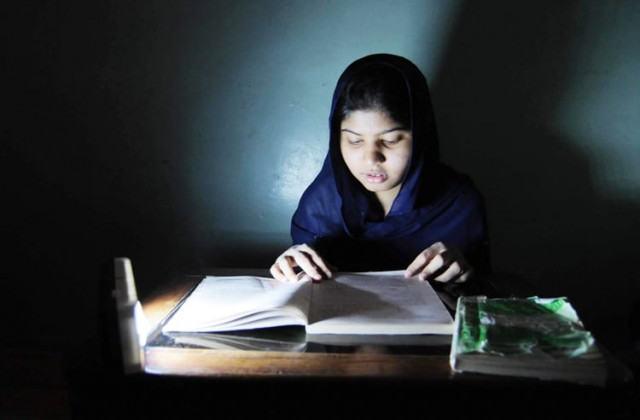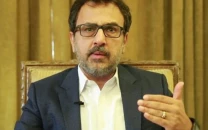New government plans $5 bln debt issue to switch lights on
The deepening power shortages have sparked violent protests and cost hundreds of thousands of jobs in the country.

A "100-day roadmap" for the energy sector will be unveiled by Sharif on June 5. PHOTO: MUHAMMAD NOMAN
The incoming administration of Prime Minister-elect Nawaz Sharif has identified widespread blackouts that last up to 20 hours a day in some areas as its top political and economic challenge.
The deepening power shortages have sparked violent protests and cost hundreds of thousands of jobs in a country already beset by high unemployment, a failing economy, widespread poverty, sectarian bloodshed and a Taliban insurgency.
Several key members of the incoming government's energy team interviewed by Reuters over the past few days said that out of a long list of challenges ranging from lack of investment to electricity theft, plugging a 500 billion rupee ($5.08 billion) financing hole was the most pressing task.
Sources in the new administration said these funds would be raised through sales of 3-month, 6-month and 12-month treasury bills.
By breaking a vicious cycle of withheld payments running through the entire power-generation chain from end consumers to electricity distributors, power plants to refiners who can't import enough oil because of unpaid fuel bills, the team hopes to bring immediate relief.
"In the first three months of our government, we plan to add 2,000-3,000 megawatts to the national grid and at least 16,000 megawatts in the medium term," said Khawaja Asif, who is due to take the energy portfolio in Sharif's cabinet that will be sworn in on June 5.
Pakistan's power sector now generates about 8,000 MW, with needs estimated at 15,000.
A "100-day roadmap" for the energy sector, due to be unveiled by Sharif on June 5, and made available to Reuters, also calls for an overhaul of a decades-old system of subsidies that is considered one of the root causes of the crisis.
100-day roadmap
"It makes no sense that you subsidise electricity at the same rate for the person who drives a Mercedes and the poor guy who rides a bicycle to work," said Asif, who briefly served as minister for petroleum and natural resources in 2008 and headed a privatisation body in a previous Sharif cabinet in the 1990s.
"People who can pay more for power will pay more. That will be the hallmark of our government's energy policy."
That, alongside a promised push to tackle electricity theft and a growing mountain of unpaid electricity bills, can set the new government on a collision course with the country's rich and influential elite.
While hooking up a cable to overhead electricity wires is the common man's way of getting power without paying for it, well-connected businessmen, politicians and even government departments simply refuse to pay their bills.
The incoming government's response is to pick competent managers to run power distribution companies and give them revenue and other performance targets.
"The priority is to appoint professional management in power distribution companies, and sack political appointees and cronies of the previous government," said Suleman Shahbaz, Nawaz Sharif's nephew who runs the party's economic think-tank.
The sector has long been plagued by waste and allegations of endemic corruption with public funds lavished on poorly-run state power firms while more efficient independent power producers were starving for cash.
"It is mind-boggling that there was so much low-hanging fruit that the previous government didn't even bother to pick," said Miftah Ismail, who co-authored the incoming administration's energy policy, referring to missed opportunities.
The 100-day plan is meant to buy the government time to focus on medium- and long-term solutions, such as modernisation of power generators, investment in new capacity, encouraging sugar mills to use biofuels to produce electricity and finally, to reduce the nation's reliance on expensive imported oil.
"We have to move from oil to coal, hydro and gas-based power generation to bring down costs," said Ismail. "There is no other way." With an estimated nationwide electricity shortfall of more than 60 percent exacerbating a balance of payments crisis, Asif says the new government is well aware of its responsibility.
"How we tackle the energy crisis will not just determine the political life of this government but also life itself of this country," he said. "Failure is not an option."



















COMMENTS
Comments are moderated and generally will be posted if they are on-topic and not abusive.
For more information, please see our Comments FAQ